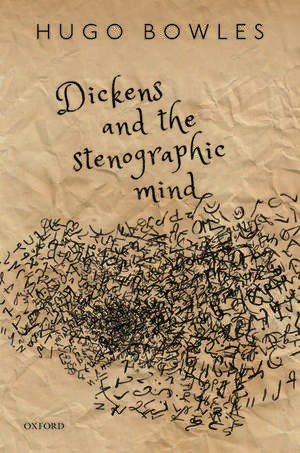Dickens and the Stenographic Mind
Autor Hugo Bowlesen Limba Engleză Hardback – 30 ian 2019
Preț: 492.84 lei
Preț vechi: 680.84 lei
-28% Nou
Puncte Express: 739
Preț estimativ în valută:
94.30€ • 98.73$ • 78.03£
94.30€ • 98.73$ • 78.03£
Carte tipărită la comandă
Livrare economică 26 martie-01 aprilie
Preluare comenzi: 021 569.72.76
Specificații
ISBN-13: 9780198829072
ISBN-10: 0198829078
Pagini: 214
Ilustrații: 36 Illustrations
Dimensiuni: 164 x 242 x 19 mm
Greutate: 0.55 kg
Editura: OUP OXFORD
Colecția OUP Oxford
Locul publicării:Oxford, United Kingdom
ISBN-10: 0198829078
Pagini: 214
Ilustrații: 36 Illustrations
Dimensiuni: 164 x 242 x 19 mm
Greutate: 0.55 kg
Editura: OUP OXFORD
Colecția OUP Oxford
Locul publicării:Oxford, United Kingdom
Recenzii
This exciting suggestion is one that I hope Bowles will pursue on a larger scale in a later work.
Dickens and the Stenographic Mind makes a significant contribution to Dickens scholarship. While it proves a fairly technical and challenging book to read, it illuminates an aspect of Dickens's life that hasn't been considered in nearly enough detail ... Bowles generously invites us to use his research to illuminate the novelist's work more fully -- an invitation we would be wise to accept, with thanks.
succeed[s] in debunking a criticism often levelled at Dickens studies: that there is nothing new to say. On the contrary, by asking that we engage with Dickens's works with a view to stenographic inspiration and material afterlives, these studies both offer fresh approaches and reveal just how much work remains to be done.
This work breaks new ground both about Dickens's life and his works insofar as his acquiring an understanding and practice of shorthand writing is concerned. It illuminates many passages in Dickens's writing that have gone unnoticed, and supplies a fresh and complete analysis of David Copperfield's recorded struggle to master the practice. It is well written - necessarily dense in explicating Gurney's system, clear and persuasive in expounding its implications about hearing, speaking, and reading as well as writing.
A very original and in many places ground-breaking piece of research; it explores an area of Dickens's professional life that has often been either ignored or skirted around, offering a series of well-grounded suggestions as to the areas and extent of impact of the 'stenographic mind' on Dickens's methods of composition and creativity with language.
Dickens and the Stenographic Mind makes a significant contribution to Dickens scholarship. While it proves a fairly technical and challenging book to read, it illuminates an aspect of Dickens's life that hasn't been considered in nearly enough detail ... Bowles generously invites us to use his research to illuminate the novelist's work more fully -- an invitation we would be wise to accept, with thanks.
succeed[s] in debunking a criticism often levelled at Dickens studies: that there is nothing new to say. On the contrary, by asking that we engage with Dickens's works with a view to stenographic inspiration and material afterlives, these studies both offer fresh approaches and reveal just how much work remains to be done.
This work breaks new ground both about Dickens's life and his works insofar as his acquiring an understanding and practice of shorthand writing is concerned. It illuminates many passages in Dickens's writing that have gone unnoticed, and supplies a fresh and complete analysis of David Copperfield's recorded struggle to master the practice. It is well written - necessarily dense in explicating Gurney's system, clear and persuasive in expounding its implications about hearing, speaking, and reading as well as writing.
A very original and in many places ground-breaking piece of research; it explores an area of Dickens's professional life that has often been either ignored or skirted around, offering a series of well-grounded suggestions as to the areas and extent of impact of the 'stenographic mind' on Dickens's methods of composition and creativity with language.
Notă biografică
Hugo Bowles is professor of English at the University of Foggia in southern Italy and publishes in applied linguistics and language education. His recent work focuses on stylistics and linguistic approaches to literature and his monograph Storytelling and Drama: Exploring narrative episodes in plays, published by John Benjamin in 2010, was awarded the 2012 Book Prize for Linguistics by the European Society for the Study of English (ESSE).
